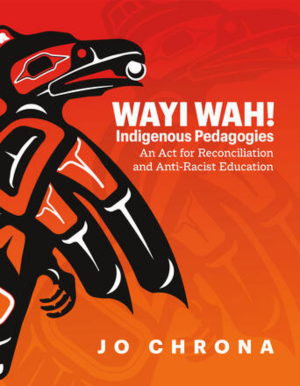
The practice of walking alongside isn’t a journey from one point to another but rather, an ongoing cycle of learning (seeing), relating, understanding, and doing. Acknowledging injustices, truth-telling, and educating others begins with you.
A great way to start to reflect on your own experiences is with Tsimshian educator Jo Chrona, author of Wayi Wah. This book, concerning Indigenous knowledges and worldviews, offers reflective activities for teachers related to positionality and reconciliation.

"Some educators may come to this work with some trepidation. You may feel that you are not equipped to engage in Indigenous education, reconciliation, or anti-racism work. You may be anxious about perpetuating misconceptions or stereotypes, making mistakes, or giving offense. In these chapters, I invite you to take a walk and have a conversation with a good mind and a good heart". - Jo Chrona
Positionality
"Articulating your positionality means locating yourself in your familial history, discerning where your knowledge comes from, and addressing the lived experiences that guide your perspective in your life, research, and teaching roles.” UBC Educational Programs Coordinator, Keirra Webb invites teachers to conside on Where does your knowledge come from? What are the lived experiences that guide your perspective in life and teaching? How do these answers shape the way you position yourself in relation to Indigenous issues and the intentions of Competency 15?
Additional Resources
Teaching philosophy
University of Waterloo website provides prompts for teachers to use to examine their own experiences and teaching philosophies
Implicit Bias
- Yale University explores implicit biases with prompts for instructor’s self-reflection
- Harvard University has created a self-assessment tool
- Brown University identifies teaching and learning resources for identifying/addressing implicit bias
Self-Reflection:
Reflective activities for teachers related to positionality; helps to guide educators through thinking processes related to reconciliation:
How I am learning to include Indigenous knowledge in the classroom: by Dr. Kathleen Gallagher